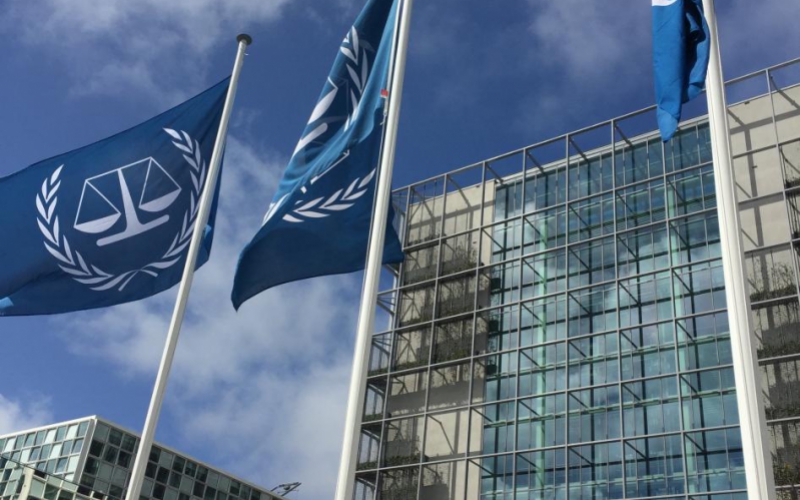#GlobalJustice Weekly: ICC judicial year opens | What's on the radar?

ICC 2018 judicial year opens
The Court will hold its first ceremonial opening of the judicial year on 18 January, kicking off what promises to be another busy year in the ICC's courtrooms. Anthony Carmona, President of ICC member state Trinidad and Tobago, will be the distinguished guest speaker at the inaugural ceremony. Carmona served as an ICC Judge from March 2012 to 2013, when he took up office as President of the country.
Meanwhile, the ICC Appeals Chamber already started its work this year on 9 January with oral hearings in the Jean-Pierre Bemba case. In March 2016, Bemba was convicted of war crimes and crimes against humanity for his role in failing to punish or deter his Congolese militia troops in the commission of rape, murder, and pillaging in the Central African Republic (CAR) between 2002 and 2003. Bemba appealed both the judgment and the 18-years sentence. The Prosecution also appealed the sentence. The five Appeals Chamber judges will hear from Bemba's counsel on his grounds for appeal, as well from the Prosecution, over the next days.
The trials of Dominic Ongwen (Uganda) and against Laurent Gbagbo and Charles Blé Goudé (Côte d'Ivoire) will resume in the week of 15 January, followed by the resumption of the trial of Bosco Ntaganda (DRC) in the week of 22 January.
For a round-up of the Court's proceedings in 2017, see our publication 2017 at a glance
What else is on the radar?
Victims of the alleged war crimes and crimes against humanity committed in Afghanistan have the right to submit their views, concerns, and expectations to the ICC Judges before they decide on the Prosecutor's request to launch a full investigation into alleged crimes committed in Afghanistan by all sides to the conflict between pro- and anti-government forces since 2003. The situation, which also considers alleged war crimes related to the conflict in Afghanistan and committed on the territory of other ICC member states, has been been under preliminary examination since 2007. Victims have until January 31st to submit their views.
Pre-Trial Chamber III last month requested that the ICC Prosecutor submit additional information and clarification on media reports and 'article 15 communications' around some instances where there could be reasonable basis to believe international military forces committed crimes falling under ICC jurisdiction. The Prosecutor indicated in her reply that if an investigation is authorized, her office could further assess such allegations within the scope of the authorized investigation, but that time constraints prior to her request prevented a comprehensive assessment of the allegations.
Also last month, Trial Chamber II issued a decision setting USD 10 million as the amount of Thomas Lubanga's personal liability in collective reparations to victims of his crimes in the DRC. Lubanga was convicted in March 2012 of the war crimes of enlisting and conscripting children under 15 years old and using them in hostilities. In due course the Chamber will decide next steps in how to implement the collective reparations to benefit victims and affected communities.
Campaign for global justice
In December, The ICC Prosecutor appointed Patricia Viseur Sellers as her Special Adviser on Gender. In the ongoing implementation of the Office of the Prosecutor's (OTP) 2014 policy on sexual and gender-based crimes (sgbc), her immediate priority is to further strengthen the OTP's responsiveness to a range of gender issues and sgbc under the Rome Statute. The ICC had its first sexual and gender-based crimes conviction last year in the Bemba trial now at the appeals stage.
Amnesty International has released a report alleging torture and other human rights abuses against 'tens of thousands' refugees and migrants detained in Libya. The report, which alleges responsibility by Libyan state officials and non-state actors, also suggests complicity by European Union (EU) governments aware of the conditions of detention and in violation of non-refoulement obligations. The ICC Prosecutor as recently as November 2017 indicated to the United Nations Security Council that the OTP investigation into the situation in Libya is paying special attention to alleged Rome Statute crimes committed against migrants.
The UN has announced it is launching a special investigation into grave crimes against peacekeepers in eastern DRC, a month after 15 peacekeepers were killed and dozens wounded in the deadliest single attack on a UN mission in nearly 25 years. The UN has also called for a credible and independent investigation into alleged use of excessive force following violent actions by authorities resulting in death and injury during recent protests in DRC's Kinshasa and other cities - actions which the UN human rights office has said suggest “deliberate intention to suppress civil and political rights."
Jordan's Foreign Minister, Ayman Safadi, announced the Arab states will begin campaigning to persuade the United Nations to recognize Palestine's statehood, with East Jerusalem as its capital. Jordan is one of three ICC member states from the Middle East-North Africa region. Palestine has been recognized as a State Party for purposes of the Rome Statute, allowing the OTP to accept jurisdiction in January 2015 to conduct a preliminary examination into alleged crimes committed as of 13 June 2014 in relation to the Israel-Palestine conflict in Gaza and East Jerusalem.
Several EU countries and the United States have spoken out against Kosovo Prime Minister Haradinaj's continued efforts to overturn a 2015 law that underpins the country's cooperation with the Kosovo Specialist Chambers, based in The Hague to address war crimes and crimes against humanity allegedly committed between 1 January 1998 and 31 December 2000. The proposal failed to receive enough votes in December despite wide political support, although there are concerns Kosovo President Hashim Thaci will renew the initiative in January. The statement made by France, Germany, the UK and the US warned of the negative consequences of leaving the Specialist Chambers, in particular for Kosovo's international and Euro-Atlantic integration.
